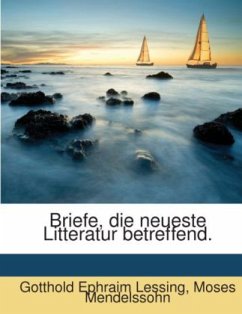Nicht lieferbar

Briefe, die neueste Litteratur betreffend.
Versandkostenfrei!
Nicht lieferbar
This is a reproduction of a book published before 1923. This book may have occasional imperfectionssuch as missing or blurred pages, poor pictures, errant marks, etc. that were either part of the original artifact,or were introduced by the scanning process. We believe this work is culturally important, and despite the imperfections,have elected to bring it back into print as part of our continuing commitment to the preservation of printed worksworldwide. We appreciate your understanding of the imperfections in the preservation process, and hope you enjoy this valuable book.++++The below data w...
This is a reproduction of a book published before 1923. This book may have occasional imperfections
such as missing or blurred pages, poor pictures, errant marks, etc. that were either part of the original artifact,
or were introduced by the scanning process. We believe this work is culturally important, and despite the imperfections,
have elected to bring it back into print as part of our continuing commitment to the preservation of printed works
worldwide. We appreciate your understanding of the imperfections in the preservation process, and hope you enjoy this valuable book.
++++
The below data was compiled from various identification fields in the bibliographic record of this title. This data is provided as an additional tool in helping to ensure edition identification:
++++
Briefe, Die Neueste Litteratur Betreffend, Volume 17; Briefe, Die Neueste Litteratur Betreffend; Moses Mendelssohn
Gotthold Ephraim Lessing, Moses Mendelssohn
Nicolai, 1764
Literary Criticism; European; German; Literary Criticism / European / German
such as missing or blurred pages, poor pictures, errant marks, etc. that were either part of the original artifact,
or were introduced by the scanning process. We believe this work is culturally important, and despite the imperfections,
have elected to bring it back into print as part of our continuing commitment to the preservation of printed works
worldwide. We appreciate your understanding of the imperfections in the preservation process, and hope you enjoy this valuable book.
++++
The below data was compiled from various identification fields in the bibliographic record of this title. This data is provided as an additional tool in helping to ensure edition identification:
++++
Briefe, Die Neueste Litteratur Betreffend, Volume 17; Briefe, Die Neueste Litteratur Betreffend; Moses Mendelssohn
Gotthold Ephraim Lessing, Moses Mendelssohn
Nicolai, 1764
Literary Criticism; European; German; Literary Criticism / European / German



